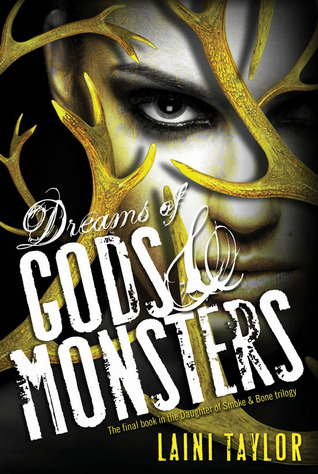Then there are the characters - these characters go through so much physically and emotionally throughout the books, and Dreams of Gods & Monsters is no exception. They're making hard decisions, trying to bring together centuries-long mortal enemies, trying to forge a new future, learning to move forward, forgive, love. Some characters are wrestling with anger or guilt or despair. There are new players in this book, as nuanced and fleshed out as those characters we've come to know and love, even those characters whose role is a short -- but in no way minor -- one (fake Grandma, I'm looking at you). (And I want to just say that Morgan Toth has taken a place on my top-10 list of characters I want to punch in the face repeatedly. Gah. That guy.).
Last, but not least, there is the story itself. These three books really feel like one long story - each piece building on the last, revealing more and more. What starts out as a simple story of star-crossed lovers becomes something epic and world-changing. There's a sense of looking at a map: in the first book, you're zoomed in on one spot on the map, and at the end of the book you've realized you're looking at a bigger map than you thought. Then in the second book, you zoom out a little more. And in the third -- holy cow! Apparently the map is ten times bigger than you thought it was at the beginning of the first book. I loved the big picture part of Dreams. I'm not going to say much so as not to ruin it, but it's definitely an epic-scale map we're looking at.
Despite the fact that I could certainly read more in this world, the ending was satisfying because it was an end to the story we started out with -- "Once upon a time, an angel and a devil fell in love." It was satisfying, because we know that despite getting our ending, life in this world is moving forward, going on. It's AN ending, but not THE ending.

